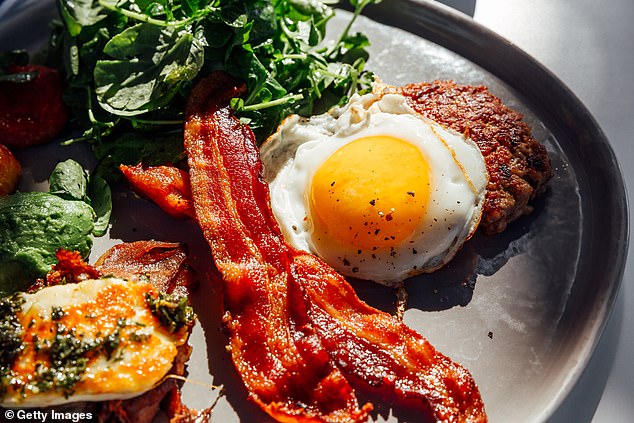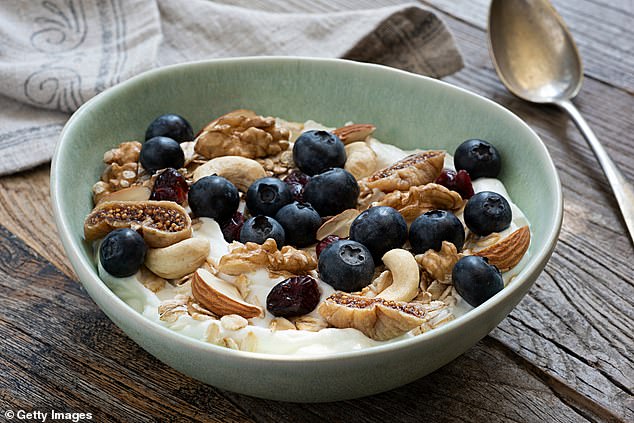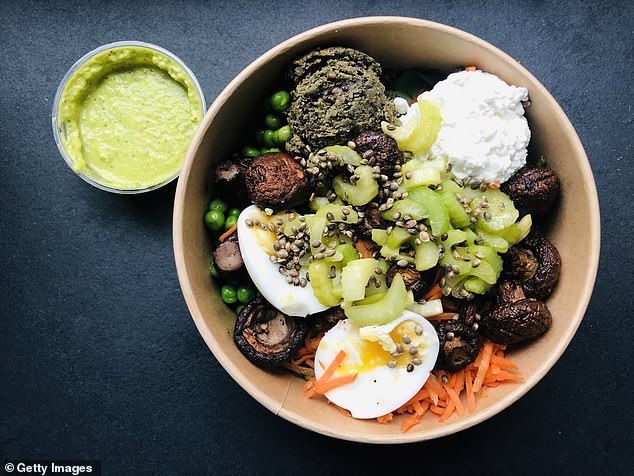DR MICHAEL MOSLEY: Why you’re not eating enough protein – and how to get the right amount
One of the things that worries me about getting older is getting weaker and weaker.
It is known that after the age of 30, unless you do something about it, you lose 5 percent of your muscle mass for ten years. This means that you can’t do much but also, over time, your pieces start to move, move and move.
That’s why I do exercises – like press-ups and squats – every morning, which work the biggest muscles in your body, thighs and upper body. Despite the fact that they never get easier or more fun, I continue with them because I know they are truly important if I want to enjoy a healthy old age.
Apart from working out, I also make sure that I eat a lot of protein. That’s because it’s important to keep your muscles and bones in good shape.

I like to start my day with eggs, writes Dr. Michael Mosley. Whether you prefer boiled, poached or fried, a few eggs add about 14g of protein.
And by ‘enough’ I mean about twice as much as the NHS recommends for adults over 19.
That’s because there’s a growing body of research showing that the guidelines (45g of protein per day for women, 55g of protein for men) are too low for good health, especially after age 60.
For example, in a recent study in the Journal of Cachexia, Sarcopenia and Muscle, researchers in Taiwan found that increasing protein intake to very high levels not only leads to a trimmer waistline and improved strength, but a reduction in especially when the blood fat levels are unhealthy.
In the study, 98 people, mostly women and all in their 60s, were asked to add a daily serving of soup containing 30g of protein to their diet, or to continue with common.
What I found interesting about this research was that at the start the volunteers were already eating above the recommended NHS levels of protein.
Including high-protein soups increased from 60g to 90g per day.
In addition to eating more protein, the soup drinkers were also asked to exercise for about nine minutes a day, and stick to this new routine for three months.
At the end of the study the soup group had not lost much fat from the waist (about 2cm), but had greater improvements in grip strength, walking speed and triglycerides levels. (Like ‘bad’ cholesterol, triglycerides build up in your arteries and are linked to heart disease and stroke.)
Protein helps you lose weight because it keeps you feeling full for longer, and when you eat more protein you tend to eat less carbohydrates, and this improves blood fat (carbs drive their rise).
This is consistent with the results of another study, published in 2005 in the Journal of Nutrition where 48 women, all in their 40s, were asked to consume the recommended amount of around 50g of protein per day, or foods with double those values. .
They were also asked to follow an exercise program where they walked briskly three days a week, and did resistance training on two days. At the end of four months the high protein diet group had lost 8.8kg (1.4st) of body fat, 3.3kg (7.3lb) more than those on the low protein diet.

Greek yogurt is also a great way to increase protein levels, especially if you add nuts. A small (200g) serving of nuts will provide about 25g of protein
It’s not just how much, but when you eat your protein; it is better to spread your meals throughout the day, rather than eating them all in one meal.
That was the conclusion of a study by the University of Texas in 2014. Volunteers were asked to spend two weeks eating a diet with 10g of protein for breakfast, 20g of protein for lunch and 60g of protein for their dinner – which is normal. of how most of us eat.
Then, for another two weeks, each meal (breakfast, lunch and dinner) contained 30g of protein.
Before and after the experiment they bravely agreed to take muscle biopsies. It was found that when the volunteers ate equal amounts of protein at every meal, they developed more muscle mass than when they ate their protein in an uneven manner.
So how can you get healthy protein in your diet?
I like to start my day with eggs. Whether you prefer boiled, poached or fried, a few eggs add about 14g of protein. If you add smoked salmon or a few rashers of bacon, they will push you up to 30g.
Or you can choose kippers for breakfast. A small kipper, about 100g, will give you 25g of protein.

There is a growing body of research showing that the guidelines are too low for good health, especially after age 60.
Greek yogurt is also a great way to increase protein levels, especially if you add nuts. A small (200g) serving of nuts will provide around 25g of protein.
For lunch, or your dinner, your best bet for a protein boost is meat or fish, with a portion the size of a palm providing about 30g of protein.
If you’re a vegetarian, then beans and lentils are a protein-packed option. One cup (200g) of cooked lentils provides about 20g of protein. And tofu, which is a great source of meat, gives you about 18g of protein per 150g.
If you are struggling to get enough protein in your diet then you may want to supplement with protein bars and drinks.

Anthropologists say that in the past singing around the fire would have played a major role in group bonding
Even though I can’t sing, I like to put together a song. And I’m not alone.
There is something special about singing as it is common to all cultures and has been done for tens of thousands of years (surprisingly our brains have more genetics than you get to songbirds).
Anthropologists tell me that in the past singing around the fire would have played a major role in group bonding, a way of expressing the feelings that unite us.
Singing also has an important role to play when it comes to rehabilitating a damaged brain. Now researchers at the University of Helsinki say they have discovered why singing helps stroke patients regain their ability to speak.
Previously this group had shown that stroke patients with aphasia (reduced ability to understand or produce speech) made better progress after four months of singing therapy in go through normal care. It also makes those patients (and their carers) feel out of place in society.
In a recent study by researchers in Helsinki they took the brains of stroke patients with aphasia who showed that after four months, those who had singing therapy (in the form of of weekly class, and singing at home three times a week) to grow new brain cells. in areas related to speech and language. And as these areas improved, so did their ability to speak.
I like the idea of growing new brain cells, so despite the protests of my wife and family from time to time, I plan to continue playing songs, albeit without sound.
A few weeks ago there were reports that a form of intermittent fasting, known as time-limited eating (where you limit the hours you eat), may be bad for your heart.
However, as I pointed out in this thread, the study that generated the negative headlines was never published and was flawed.
So I was happy to see the results of a recent study, published in the Journal of the Medical Heart Association, which shows that eating on time can really help the heart.
A group of 48 middle-aged people who had recently had a heart attack were asked to either continue their normal diet or try a time-limited diet called the 16:8 – to fast every day for 16 hours, then eat in the past. eight hour window.
After six months the fasting group had greater improvements in blood pressure, and their hearts also functioned better than the control group.
What advice do your children appreciate the most? Researchers at the University of Illinois Urbana-Champaign recorded the advice parents gave to their children about to start middle school. When they followed this up later, they found that the best advice—from a child’s point of view—was to treat new experiences, even negative ones, as learning opportunities. The good news is that even young people who seemed disinterested tried to use their parents’ advice.
#MICHAEL #MOSLEY #youre #eating #protein #amount